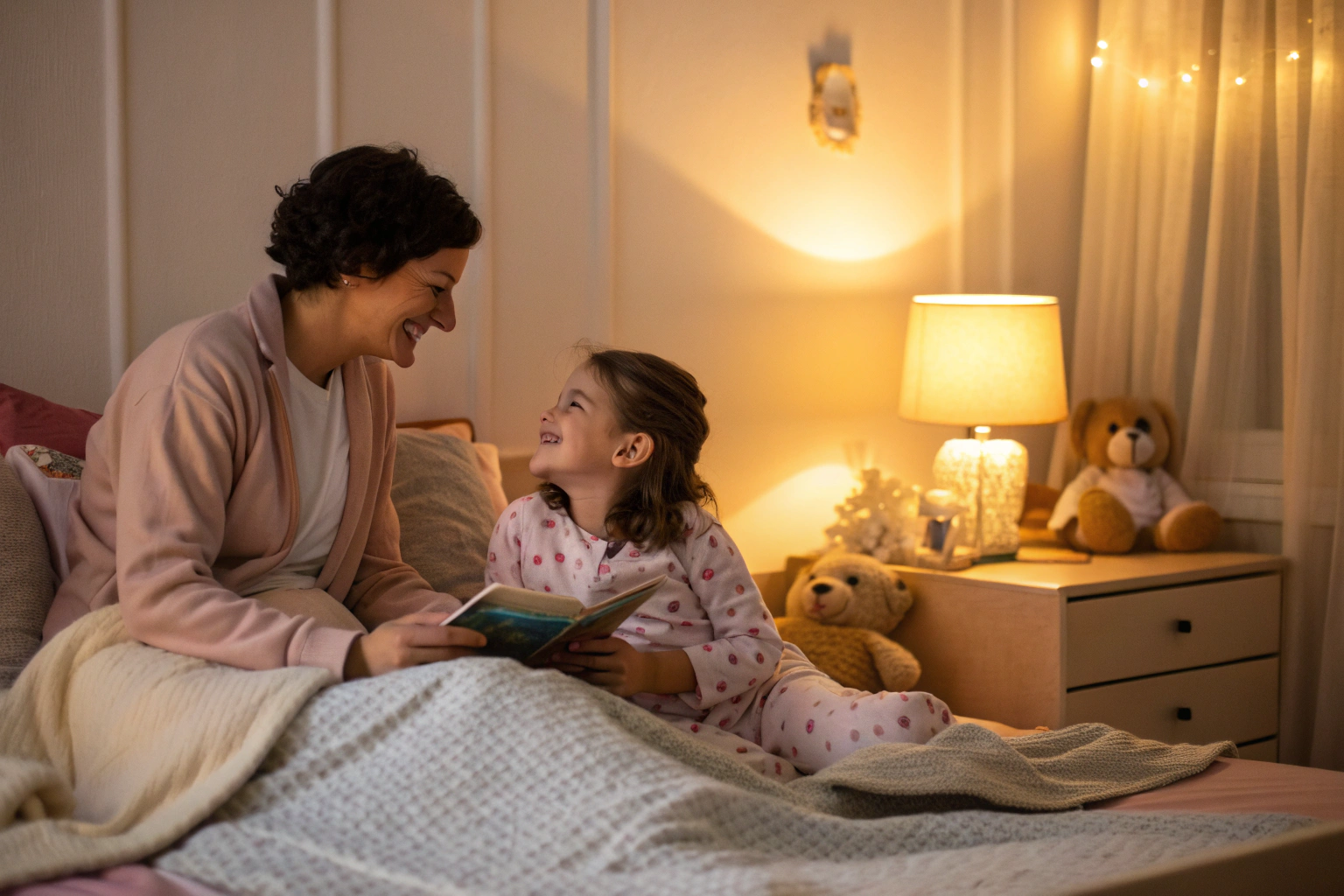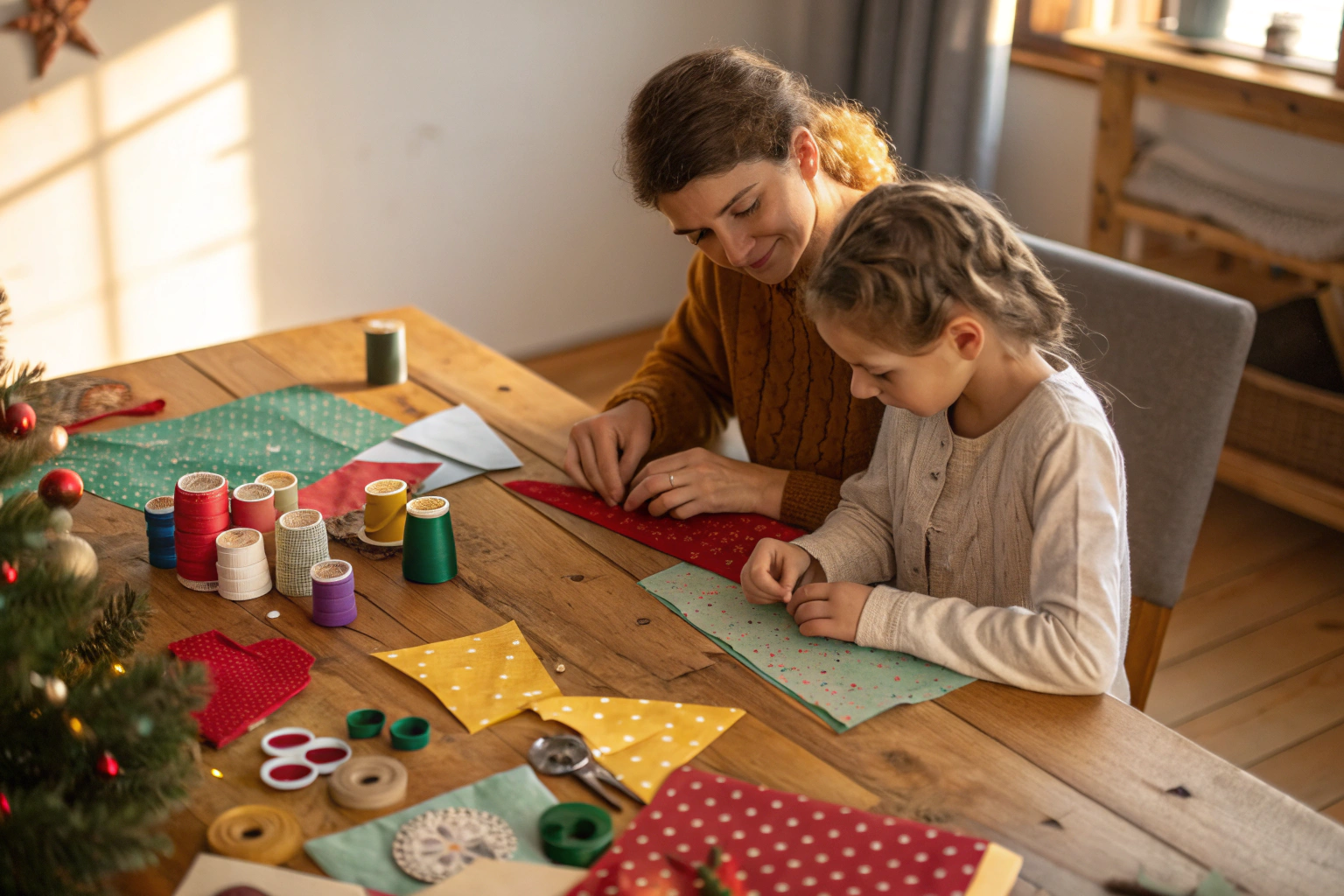Bedtime questions for kids are conversation prompts parents use to help their child relax and connect at the end of the day. This simple routine helps calm a busy mind, encourages sharing feelings, and strengthens the parent-child bond. Instead of struggles, bedtime becomes a positive moment for reflection, easing nighttime anxiety and making it easier for children to fall asleep peacefully. This practice is a screen-free way to create a consistent and calming end-of-day ritual.
Key Benefits at a Glance
- Reduces Bedtime Anxiety: Creates a safe, calming routine that helps children process worries and fears before sleep, leading to less Crying and fewer nighttime wakings.
- Strengthens Your Bond: Fosters open communication and deepens your connection by showing your child you are interested in their thoughts and feelings.
- Boosts Emotional Intelligence: Encourages kids to identify, name, and express their emotions in a healthy way, building self-awareness from an early age.
- Easy and Screen-Free: Turns a potentially stressful routine into a peaceful tradition without needing any apps, toys, or special preparation.
- Sparks Imagination: Fun and silly questions encourage creativity, positive thinking, and happy thoughts, ending the day on a high note.
Purpose of this guide
This guide is for parents and caregivers looking to transform bedtime from a stressful chore into a cherished connection ritual. It solves the common problem of bedtime resistance and helps you understand your child’s inner world by creating a space for them to share openly. You will learn how to use simple questions to calm a busy mind, build trust, and establish a positive end-of-day routine. We’ll explain how to ask effective open-ended questions, common mistakes to avoid (like grilling your child), and how this simple habit builds a foundation for lifelong communication.
Introduction to bedtime questions for kids
Last Tuesday night, as I tucked my seven-year-old into bed, I asked her a simple question: “What made your heart feel full today?” Her response stopped me in my tracks. Instead of the usual “I don’t know” or quick recap of activities, she shared how proud she felt when she helped her classmate who was crying at recess. That moment revealed a depth of empathy I hadn’t fully recognized in her before.
This practice of asking bedtime questions for kids has fundamentally transformed how my children and I connect. What started as a way to slow down our hectic evenings has become the cornerstone of our parent-child relationship. These meaningful conversations during our bedtime routine have opened doors to understanding my children’s inner worlds in ways I never imagined possible.
- Strengthens parent-child bonds through meaningful dialogue
- Improves children’s communication and emotional expression skills
- Builds emotional intelligence and self-reflection abilities
- Creates positive associations with bedtime routine
The science behind why bedtime is the perfect time for connection
The transition to sleep creates a unique neurological state where children naturally become more emotionally open and reflective. As the day’s stimulation winds down, the brain shifts into what researchers call a receptive state – the perfect window for deeper parent-child bonding. During this time, children’s defenses soften, making them more willing to share thoughts and feelings they might guard during busier daylight hours.
Use imaginative questions to help children process their day and build emotional vocabulary: Fun Questions to Ask Kids.
“Pediatric experts note that children who engage in meaningful bedtime conversations are 61% more likely to express their emotions constructively and have healthier sleep routines.”
— WebMD, April 2024
I’ve observed this phenomenon countless times with my own children. The same child who gives me one-word answers after school becomes wonderfully talkative when the lights are dimmed and we’re settled into our quiet bedtime space. This vulnerability isn’t weakness – it’s an opportunity. The combination of physical comfort, reduced distractions, and the security of routine creates an environment where authentic bedtime conversations can flourish.
Research in child psychology supports what many parents intuitively understand: bedtime represents a sacred space for connection. When children feel safe and unhurried, their natural curiosity about relationships and emotions emerges. This is why bedtime questions for kids can be so much more effective than trying to have deep conversations during the chaos of morning routines or homework time.
Quick start one question to ask tonight
Tonight, try asking your child: “What was one moment today that made you feel happy, and one moment that was challenging for you?” This question works beautifully because it acknowledges that days contain both positive and difficult experiences, giving children permission to share authentically without feeling like they need to be perpetually cheerful.
The power of this conversation starter lies in its balance. By asking about both joy and challenges, you’re modeling emotional honesty and showing your child that all feelings are welcome in your relationship. When they share their happy moment, celebrate it with them. When they mention something challenging, resist the urge to immediately fix or minimize it – simply listen and validate their experience.
- Tonight’s Question: “What was one moment today that made you feel happy, and one moment that was challenging for you?”
- Listen without judgment and validate their feelings
- Share your own answer to model openness
- Ask gentle follow-up questions if they seem willing to elaborate
Benefits beyond just connection
The developmental benefits of regular bedtime questions extend far beyond the immediate warmth of connection. I’ve watched my children develop increasingly sophisticated emotional intelligence as they practice identifying and articulating their feelings each night. Their communication skills have blossomed as they learn to express complex thoughts and experiences in our safe bedtime space.
Perhaps most remarkably, these nightly conversations have fostered critical thinking and reflection habits that serve my children well throughout their days. They’ve begun naturally processing experiences more thoughtfully, considering not just what happened but how they felt about it and what they learned. This self-awareness translates into better decision-making, stronger friendships, and increased resilience when facing challenges.
Creating your bedtime question routine
Establishing a consistent bedtime question routine requires thoughtful planning and gentle persistence. I’ve learned that timing is crucial – questions work best when children are calm but not yet drowsy. In our house, this sweet spot comes after baths and teeth brushing but before story time, when the day’s energy has settled but minds are still alert and engaged.
The environment matters tremendously. I dim the lights, put away devices, and create a cozy atmosphere that signals this is special time together. Sometimes we snuggle in bed, other times we sit in a comfortable chair – the key is eliminating distractions and creating physical closeness. This isn’t the time for multitasking or rushing; meaningful conversations require our full presence and attention.
Consistency builds trust and expectation, but flexibility prevents the practice from becoming mechanical. Some nights my children are bursting with stories, other nights they’re exhausted and need gentler approaches. I’ve learned to read their energy and adjust accordingly – sometimes asking just one simple question, other times diving deeper into extended conversations. The goal is connection, not completing a checklist.
For more ideas, see the CDC’s bonding tips for strengthening your parent-child connection through routines.
- Complete bath and teeth brushing first
- Dim lights and create calm environment
- Ask 1-2 questions during quiet time
- Listen actively without rushing responses
- End with story time or gentle music
How to use these questions creatively
The question jar has become one of our family’s most treasured bedtime rituals. My children decorated a special container with stickers and drawings, and we filled it with colorful strips of paper, each containing a different question. The anticipation of reaching into the jar adds an element of surprise and excitement to our routine, transforming question time into something they genuinely look forward to rather than endure.
Creating conversation cards with illustrations has been another successful approach, especially with younger children who respond well to visual cues. We’ve made cards featuring different emotions, scenarios, and hypothetical situations that spark imagination and discussion. The act of choosing a card gives children a sense of control over the conversation while still providing structure for meaningful dialogue.
- Create a decorated question jar with colorful strips
- Let children take turns picking questions
- Use conversation cards with illustrations
- Keep a bedside journal for memorable answers
- Make question time feel special, not like an interview
Questions to help your child process their day
Daily reflection through targeted questions has become one of the most powerful tools in our bedtime arsenal. I discovered that children who actively process their experiences before sleep tend to have better emotional regulation and more restful nights. These questions help them organize their thoughts, identify patterns in their feelings, and develop healthy coping strategies for future challenges.
The key to effective daily processing questions is creating space for both positive and challenging experiences. Children need to know that difficult emotions are normal and acceptable, while also celebrating moments of joy and accomplishment. I’ve found that questions focusing on specific moments rather than general feelings tend to yield richer, more detailed responses that lead to meaningful discussions.
- What made you smile today?
- Was there a moment when you felt proud of yourself?
- What was the hardest part of your day?
- Who did you help today, or who helped you?
- What are you most grateful for right now?
- If you could change one thing about today, what would it be?
- What did you learn something new about?
- How did you show kindness today?
- What are you looking forward to tomorrow?
- What feeling did you have the most today?
Age appropriate questions from toddlers to teens
Adapting bedtime questions for different developmental stages requires understanding both cognitive abilities and emotional needs at each age. What works beautifully for a curious five-year-old might feel juvenile to a sophisticated twelve-year-old, while complex philosophical questions that engage teenagers can overwhelm younger children. I’ve learned to adjust not just the content but also my expectations and response style as my children have grown.
| Age Group | Question Style | Sample Question | Expected Response |
|---|---|---|---|
| Toddlers (2-4) | Simple, concrete | What was your favorite toy today? | One-word or short phrase |
| Early Elementary (5-8) | Descriptive, feelings-focused | How did you feel when that happened? | Basic emotional vocabulary |
| Tweens (9-12) | Reflective, social | What was challenging about your friendships today? | More complex thoughts and feelings |
| Teens (13+) | Abstract, values-based | What decision are you most proud of this week? | Deeper self-reflection and reasoning |
Questions to discover your child’s personality and values
Personality discovery questions have revealed aspects of my children that might have remained hidden for years. These deeper inquiries go beyond daily experiences to uncover core beliefs, preferences, and moral reasoning. I’ve been continually surprised by the wisdom and unique perspectives my children express when given the opportunity to reflect on bigger questions about life, relationships, and character.
Strengthen your bond through consistent, meaningful rituals—like nightly conversations or shared crafting: Ultimate Guide to Summer Family Traditions.
The insights gained from these conversations have transformed how I parent each child individually. Understanding their intrinsic motivations, fears, and values has helped me provide more targeted support and encouragement. When I discovered my quiet child’s deep sense of justice through bedtime conversations, I was able to channel that passion into volunteer opportunities that gave her confidence and purpose.
- If you could have any superpower, what would it be and why?
- What makes a good friend?
- When do you feel most like yourself?
- What’s something you believe that others might not?
- If you could change one rule at home or school, what would it be?
- What do you think is the most important thing in life?
- When do you feel most proud of who you are?
- What would you do if you found $100?
- What’s something adults don’t understand about kids?
- If you could teach everyone in the world one thing, what would it be?
How these questions strengthen your relationship
Trust deepens when children realize their authentic thoughts and feelings are not only welcomed but celebrated. I remember the night my ten-year-old shared his belief that “grown-ups worry too much about things that don’t really matter.” Instead of dismissing his perspective, I asked him to explain more. His thoughtful response about focusing on relationships over achievements fundamentally shifted how I approached parenting decisions.
This validation of their inner world creates a foundation for deeper connection that extends far beyond bedtime. When children know their parents genuinely want to understand their perspectives, they become more willing to share struggles, dreams, and concerns. The acceptance they experience during these intimate conversations builds confidence in their own worth and judgment, creating resilient individuals who trust their instincts while remaining open to guidance.
Imagination boosting bedtime questions
Creativity flourishes when children’s minds are given permission to wander into fantastical territories. I’ve noticed that imagination-focused questions often produce the most animated and joyful bedtime conversations, with my children’s eyes lighting up as they describe elaborate adventures and impossible scenarios. These playful inquiries serve a deeper purpose than mere entertainment – they develop abstract thinking skills and encourage innovative problem-solving.
Tired of getting a simple “fine” in response to “how was your day”? These unusual questions will unlock your child’s imagination and help you learn so much more: Ask Kids These Creative Questions!
The influence of these hypothetical scenarios extends into my children’s dreams and daytime creativity. After a particularly engaging conversation about what they would do if they could fly, my daughter spent the next week creating detailed drawings of aerial adventures and writing stories about flying children. These questions plant seeds of possibility that bloom into artistic expression, creative writing, and inventive play.
- If you could visit any place in the universe, where would you go?
- What would happen if animals could talk for one day?
- If you could invent something magical, what would it do?
- What do you think dreams are made of?
- If you could be any character from a book, who would you be?
- What would your perfect treehouse look like?
- If you could time travel, would you go to the past or future?
- What do you think clouds think about?
- If you could have dinner with anyone, real or imaginary, who would it be?
- What would you do if you woke up and you were invisible?
Silly and fun questions to end the day with laughter
Humor has the remarkable ability to dissolve bedtime resistance and transform potential struggles into moments of pure joy. I’ve discovered that children who end their days with laughter fall asleep more easily and wake up with brighter dispositions. These playful questions serve as emotional reset buttons, helping children release any lingering stress or disappointment from their day.
Sample some traditional bedtime routines that incorporate humor and playfulness.
The positive associations created through silly bedtime questions extend far beyond sleep. When children anticipate fun and connection at bedtime, they’re more cooperative with the entire routine. Instead of viewing bedtime as the end of fun, they see it as a special time for bonding and entertainment. This shift in perspective eliminates many common bedtime battles and creates a peaceful transition to sleep.
- If you were a food, what food would you be and why?
- What’s the silliest thing that happened to you today?
- If animals wore clothes, what would a penguin wear?
- What would you do if you were the parent for a day?
- If you could only speak in questions for a whole day, what would you ask?
- What’s the weirdest thing you can think of right now?
- If you had to dance every time you walked, what would that look like?
- What would happen if everything was made of jello?
- If you could make a new holiday, what would we celebrate?
- What’s the funniest name you can think of for a pet dinosaur?
Deepening the conversation follow up question techniques
Active listening and thoughtful follow-up questions transform simple exchanges into rich dialogues that reveal layers of meaning and emotion. When children offer brief responses, I’ve learned to resist the urge to move on quickly. Instead, I use specific techniques to gently encourage elaboration while respecting their communication style and energy level.
Modeling vulnerability by sharing my own experiences first often opens doors that direct questioning cannot. When I tell my children about my own challenges or joys before asking about theirs, they see that authentic sharing is valued and safe. This approach particularly helps reserved children who need reassurance that their thoughts and feelings will be received with understanding rather than judgment.
The art of conversation extension lies in showing genuine curiosity rather than conducting an interview. I’ve found that reflecting back what I hear, asking about emotions rather than just facts, and creating comfortable silences for thinking time all contribute to richer exchanges. Sometimes the most profound insights emerge from those quiet moments when children feel truly heard and understood.
- Mirror their words back: ‘So you felt frustrated when…’
- Ask ‘What made you think that?’ or ‘How did that feel?’
- Share your own similar experience first
- Validate feelings before asking for more details
- Use silence comfortably – give them time to think
- Ask ‘Can you tell me more about that?’
- Reflect emotions: ‘That sounds exciting/difficult/confusing’
Troubleshooting when kids don’t want to talk
Reluctant communicators require patience, creativity, and respect for their individual temperaments and needs. I’ve learned through trial and error that forcing conversation creates resistance, while creating inviting opportunities for connection often yields surprising results. Some children need more time to process their thoughts, others prefer indirect approaches to sharing, and many simply need to know that silence is acceptable too.
The breakthrough with my more reserved child came when I stopped viewing quiet responses as failures and started appreciating them as part of his communication style. By continuing to offer questions without pressure, maintaining physical closeness, and sharing my own thoughts even when he didn’t reciprocate, I demonstrated that our bedtime time together was valuable regardless of how much talking occurred.
Bedtime resistance often signals underlying needs that questions can actually address. An overtired child might benefit from simpler, more soothing inquiries, while an anxious child might need questions that help them process worries. Understanding the root cause of resistance allows parents to adapt their approach rather than abandon the practice altogether.
- Overtired child: Keep questions very simple or skip entirely
- One-word answers: Model longer answers yourself first
- Resistant teen: Ask if they’d prefer to just listen to music together
- Attention challenges: Use visual aids or fidget toys during conversation
- Emotional overwhelm: Focus on comfort before questions
- Sibling interruptions: Create individual question time for each child
- Busy mind: Try ‘wondering’ questions instead of direct ones
Documenting your bedtime conversations
Memory keeping transforms fleeting bedtime moments into lasting treasures that families can revisit and cherish for years to come. I started keeping a simple notebook beside our beds, jotting down particularly meaningful responses or funny comments immediately after tucking my children in. These brief notes have become some of our family’s most precious childhood memories.
The documentation process itself has unexpected benefits beyond preservation. When children know their thoughts are valuable enough to record, they often put more consideration into their responses. Additionally, reviewing past entries reveals growth patterns and recurring themes that might otherwise go unnoticed, providing insights that inform future conversations and parenting decisions.
Let’s connect your favorite bedtime questions
Community wisdom has enriched our bedtime question practice in ways I never expected. Fellow parents have shared creative approaches, breakthrough questions, and solutions to challenges that have enhanced our family’s experience. I’m constantly learning from other families’ innovations and successes, discovering new questions and techniques that bring fresh energy to our routine.
Your experiences and insights could benefit countless other families navigating this parenting journey. The most memorable responses often come from the most unexpected questions, and sharing these moments creates a supportive network of parents committed to meaningful conversations with their children. I’d love to hear about your successes, challenges, and discoveries in the comments below.
Conclusion the lasting impact of bedtime questions
These nightly conversations have created something precious and irreplaceable in our family – a foundation of trust, understanding, and emotional connection that strengthens with each passing year. My children have learned that their thoughts and feelings matter, that their parents are genuinely interested in their inner worlds, and that bedtime represents safety and acceptance rather than the end of attention and care.
Looking toward the future, I believe these childhood experiences are building the framework for our adult relationships. The communication skills, emotional intelligence, and trust established through bedtime questions will serve my children throughout their lives, influencing how they form relationships, process challenges, and maintain connections with family. The investment of a few minutes each night is creating family bonds that will last a lifetime.
Frequently Asked Questions
What are some fun questions to ask kids at bedtime?
Fun bedtime questions for kids can include “What was the highlight of your day?” or “If you could be any animal for a night, which one and why?” These types of questions encourage reflection and excitement, helping children unwind positively. They also strengthen parent-child bonds by fostering open, enjoyable conversations before sleep.
Why should I ask my child questions at bedtime?
Asking your child questions at bedtime promotes emotional connection and helps them process daily experiences, leading to better sleep quality. It encourages self-expression and can improve their ability to articulate thoughts and feelings. Overall, this routine builds trust and creates lasting memories in a calm setting.
What are the best bedtime questions to help children express their feelings?
The best bedtime questions for expressing feelings include “What made you feel happy today?” or “Was there anything that upset you, and why?” These prompts create a safe space for kids to share emotions, fostering emotional intelligence. Regularly using them can help children develop healthier ways to manage their feelings over time.
How can I incorporate bedtime questions into our existing routine?
Incorporate bedtime questions by adding them right after storytime or brushing teeth, keeping the session to 5-10 minutes for consistency. Start with one or two questions to ease into it, and adjust based on your child’s responses to maintain a relaxed flow. This seamless integration turns questions into a cherished part of the nightly wind-down.
What are creative bedtime questions to spark a child’s imagination?
Creative bedtime questions like “If you could build a dream house out of candy, what would it look like?” or “What adventure would you go on if you had a magic carpet?” spark imagination effectively. They encourage kids to think outside the box and share whimsical ideas. This not only makes bedtime fun but also nurtures creativity and storytelling skills.





